Electrical hazards are a common cause of accidents, injuries, and fires in homes and workplaces. By understanding the potential risks associated with electricity and taking appropriate precautions, you can protect yourself, your family, and your property from harm.
Common Electrical Hazards in Homes
Residential electrical hazards can arise from a variety of sources, including:
- Overloaded electrical outlets and circuits
- Damaged or frayed wiring
- Improper use of extension cords
- Faulty electrical appliances
- Incorrectly installed or maintained electrical systems
Identifying Electrical Hazards at Work
Workplace electrical hazards can be caused by:
- Inadequate or poorly maintained electrical equipment
- Insufficient training in electrical safety procedures
- Unsafe work practices, such as bypassing safety devices
- Wet or damp conditions near electrical equipment
- Improper use of portable electrical tools
Essential Electrical Safety Tips
To minimize the risks associated with electrical hazards, it’s essential to follow proper safety procedures at home and in the workplace.
Electrical Safety at Home
- Regularly inspect electrical outlets, wiring, and appliances for signs of damage or wear.
- Avoid overloading outlets or circuits, and use surge protectors to protect sensitive electronics.
- Make certain that your home’s electrical infrastructure is current and complies with the latest safety guidelines.
- Keep electrical appliances and cords away from water sources, such as sinks and bathtubs.
- Teach children about the dangers of electricity and the importance of electrical safety.
Electrical Safety in the Workplace
- Ensure that employees receive suitable training in electrical safety practices and the correct usage of electrical equipment.
- Implement and enforce safe work practices, such as lockout/tagout procedures and the use of personal protective equipment (PPE).
- Inspect and maintain electrical equipment regularly to ensure it’s in good working condition.
- Keep work areas clean, dry, and free from clutter to minimize the risk of electrical accidents.
- Encourage employees to report any electrical hazards or concerns promptly.
Importance of Safe Electrical Products
Using safe and reliable electrical products is crucial for ensuring electrical safety at home and in the workplace. High-quality products not only reduce the risk of electrical accidents but also enhance energy efficiency and overall performance.
Chint LED Light: A Safe and Efficient Solution
One example of a safe and efficient electrical product is the Chint LED Light. Created with innovative technology, the Chint LED Light provides outstanding energy efficiency, durable performance, and reduced heat generation, rendering it a safer choice compared to classic incandescent bulbs. Additionally, the Chint LED Light is built to strict safety standards, ensuring that it operates reliably and poses minimal risk to users.
Conclusion
Maintaining electrical safety is crucial to safeguard yourself, your loved ones, and your possessions from possible dangers. By understanding common electrical hazards and implementing proper safety procedures, you can significantly reduce the risk of accidents and injuries. Ensuring that you use safe and reliable electrical products, such as the Chint LED Light, can further enhance your overall electrical safety. Stay informed, remain vigilant, and prioritize electrical safety at home and in the workplace to create a safer environment for everyone.
FAQs
- What are some common electrical hazards in homes?
Some common electrical hazards in homes include overloaded electrical outlets and circuits, damaged or frayed wiring, improper use of extension cords, faulty electrical appliances, and incorrectly installed or maintained electrical systems.
2. How can I prevent electrical accidents in the workplace?
Avoiding electrical incidents in the workplace requires offering suitable electrical safety training to employees, establishing and enforcing secure work practices, routinely examining and maintaining electrical equipment, ensuring workspaces are tidy and free from moisture, and urging employees to report any electrical concerns without delay.
3. Why is it important to use safe electrical products?
Using safe electrical products is crucial for reducing the risk of electrical accidents and ensuring overall electrical safety. High-quality products also enhance energy efficiency and performance, leading to cost savings and a more sustainable environment.
4. How does the Chint LED Light contribute to electrical safety?
The Chint LED Light contributes to electrical safety by offering superior energy efficiency, long-lasting performance, and minimal heat output compared to traditional incandescent bulbs. Additionally, it is built to strict safety standards, ensuring reliable operation and minimal risk to users.
5. What should I teach my children about electrical safety?
Educate your children on the risks associated with electricity, the significance of electrical safety, and the correct handling of electrical devices and equipment.
Encourage them to report any damaged electrical devices or cords and to avoid playing with electrical outlets or cords.

